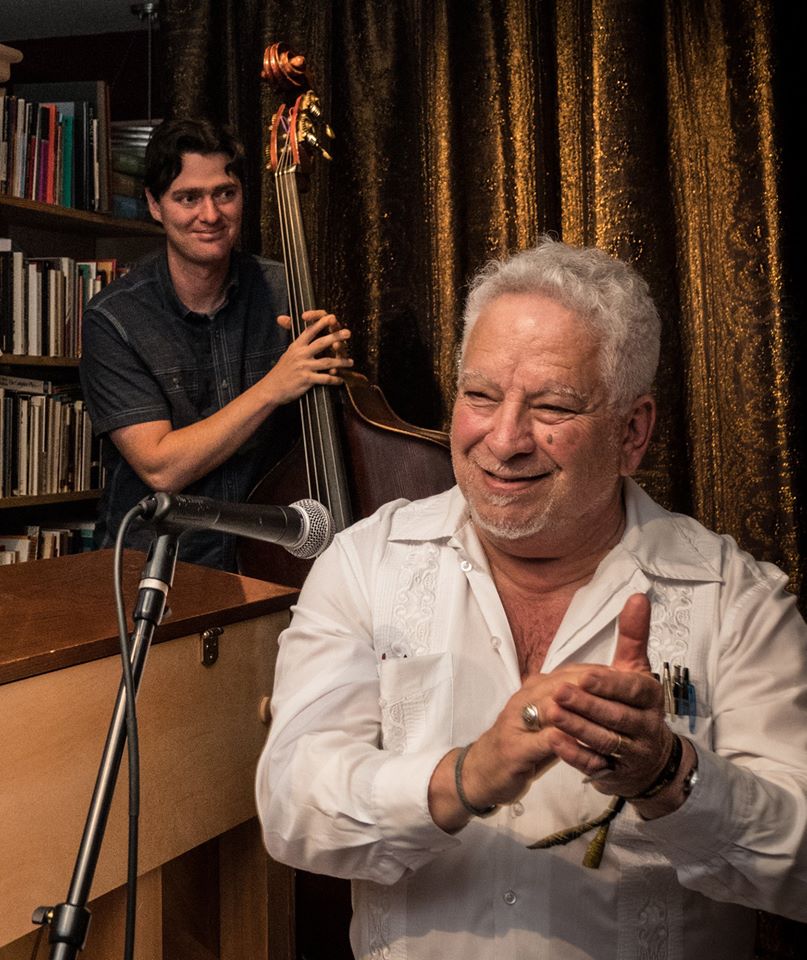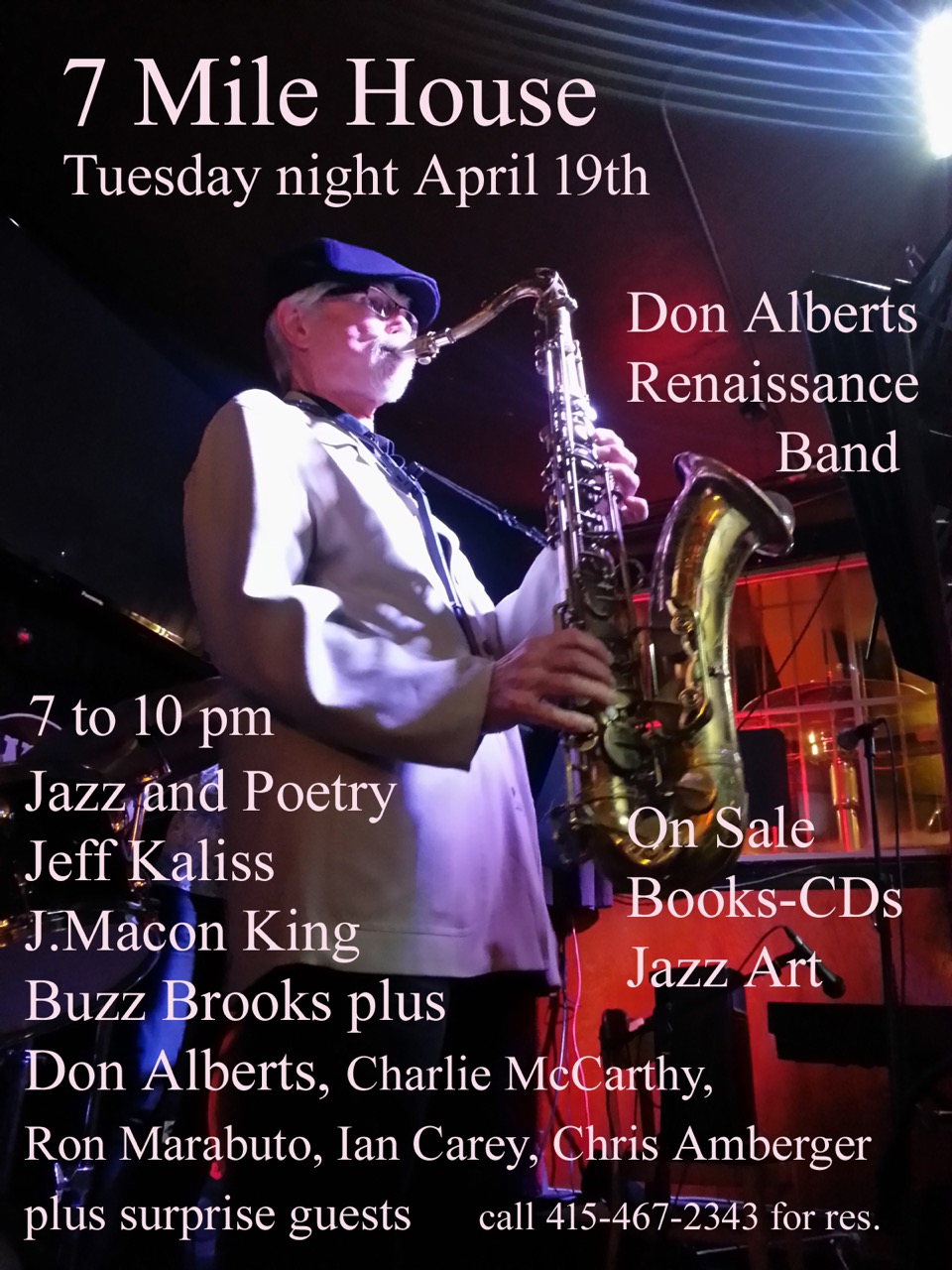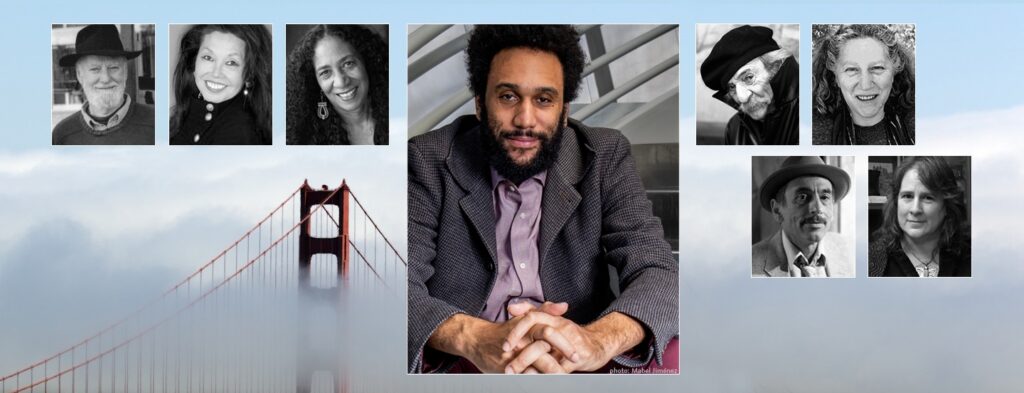
Introduction to Tongo Eisen-Martin, San Francisco’s 8th Poet Laureate, by Jeff Kaliss
Some things in the poems of Tongo Eisen-Martin are as ready and right-on at they can be.
Consider the title of “Lower-Class Artist Imagines”, one of the three the new Poet Laureate of San Francisco has chosen to share with us here. Or consider this line from that same work: “The secret to writing poems/is to not deflect.” Then get ready, in much of the rest of what you read, for a swerving dreamworld bus ride through the Mission District of this artful activist’s heartfelt mission. And pay close attention, as if every stop is yours.
“My imagination is a local imagination,” Tongo tells me in a recent interview. “Along the way, I do know there’s a certain symmetry of syllables that gives a cluster of words a ring. There are certain kinds of, like, mathematical patterns that you can employ, or that you can naturally stumble on. But I wouldn’t say I have a lot of control over that. What I can control most is the exertion of insight.
“I start with the excavation of a few words, or an implication, and then I poke around,” he continues. “Every poem is like its own person, in that it might have a dominant presence. Like, in general, this person is a sullen bus driver, or this pioneer is an excited tenth grader. Still, both of those people are full of all kinds of forces and backstories and contradictions.
“And so along the way, I start getting a sense of who the poem is. And it’s at that point that I’m conscious of some kind of visualization that this poem is a speech you wander up to. Keeping the power of the ear amplified, as the power of the voice, you’re listening to the poem outside of yourself. You can pull it off as a dual mind that is both constructing and just experiencing. Being successful at listening is the best way to figure out what the poem is.”
So read Tongo now, listen while you do it, and then go write something for others to hear.
3 Poems by Tongo Eisen-Martin
I Make Promises Before I Dream
No unclaimed, cremated mothers this year Nor collateral white skin No mothers folding clothes to a corporate park preamble No sons singing under the bright lights of a lumber yard Quantum reaganomics and the tap steps of turning on a friend New York trophy parts among the limbs of decent people Being an enraged artist is like entering a room and not knowing what to get high off of My formative symbols/My upbringing flying to an agent’s ears I might as well be an activist Called my girlfriend and described All the bottles segregationists had thrown at me that day Described recent blues sites and soothing prosecutions I feared for my poetry You have to make art every once in a while While in the company of sell-outs Accountant books in deified bulk Or while waiting for a girl under a modern chandelier Or in your last lobby as a wanderer The prison foot races the museum My instrument ends I mean, what is a calendar to the slave? Also, what is a crystal prism? “He bought this bullet, bought its flight, then bought two more”
END
Introduction to Tongo Eisen-Martin, San Francisco’s 8th Poet Laureate, by Jeff Kaliss
Some things in the poems of Tongo Eisen-Martin are as ready and right-on at they can be.
Consider the title of “Lower-Class Artist Imagines”, one of the three the new Poet Laureate of San Francisco has chosen to share with us here. Or consider this line from that same work: “The secret to writing poems/is to not deflect.” Then get ready, in much of the rest of what you read, for a swerving dreamworld bus ride through the Mission District of this artful activist’s heartfelt mission. And pay close attention, as if every stop is yours.
“My imagination is a local imagination,” Tongo tells me in a recent interview. “Along the way, I do know there’s a certain symmetry of syllables that gives a cluster of words a ring. There are certain kinds of, like, mathematical patterns that you can employ, or that you can naturally stumble on. But I wouldn’t say I have a lot of control over that. What I can control most is the exertion of insight.
“I start with the excavation of a few words, or an implication, and then I poke around,” he continues. “Every poem is like its own person, in that it might have a dominant presence. Like, in general, this person is a sullen bus driver, or this pioneer is an excited tenth grader. Still, both of those people are full of all kinds of forces and backstories and contradictions.
“And so along the way, I start getting a sense of who the poem is. And it’s at that point that I’m conscious of some kind of visualization that this poem is a speech you wander up to. Keeping the power of the ear amplified, as the power of the voice, you’re listening to the poem outside of yourself. You can pull it off as a dual mind that is both constructing and just experiencing. Being successful at listening is the best way to figure out what the poem is.”
So read Tongo now, listen while you do it, and then go write something for others to hear.
3 Poems by Tongo Eisen-Martin
I Make Promises Before I Dream
No unclaimed, cremated mothers this year Nor collateral white skin No mothers folding clothes to a corporate park preamble No sons singing under the bright lights of a lumber yard Quantum reaganomics and the tap steps of turning on a friend New York trophy parts among the limbs of decent people Being an enraged artist is like entering a room and not knowing what to get high off of My formative symbols/My upbringing flying to an agent’s ears I might as well be an activist Called my girlfriend and described All the bottles segregationists had thrown at me that day Described recent blues sites and soothing prosecutions I feared for my poetry You have to make art every once in a while While in the company of sell-outs Accountant books in deified bulk Or while waiting for a girl under a modern chandelier Or in your last lobby as a wanderer The prison foot races the museum My instrument ends I mean, what is a calendar to the slave? Also, what is a crystal prism? “He bought this bullet, bought its flight, then bought two more”
END
Lower-Class Artist Imagines
Grip my heart tighter, Lord
Help me write on this sleeve…
like listening to Nina Simone later in life
The poet takes over
for his former self:
The secret to writing poems
is to not deflect.
If you do not know anything
fretted about the color blue,
don’t go calling yourself
a child at heart.
If you have never improvised an elevator ride,
don’t go calling yourself in need of prayer.
Grace be to gang tattoos
a Reagan meeting adjourns and modern plant life begins
along with dry out-of-body insight
strange fake forest in
a poor person’s bird atrium
bark around the Mississippi mixtape or
Carceral state mythology of a factory’s first Black Chaplin
Rotted food staring at a child
The minor progressions of revolution
drumming Molotov fills
three quarters and a floor stain staring as well
white children selling a child
(I mean I was there the night that
San Francisco disappeared)
Think of me when the sun dies
Half man on scratch paper
Half pickpocket with flailing arms
double fisted
Alabama in my Paris
I am an alcoholic in search of history books
ruining the light rail in search of
history books
(I am limping to poetry)
Along with a caste of haves-adjacent
A slave deck blossoms sweet baby Easter blood
Maybe loss of crossroad
along with unprovable music theory
(the poem turns into absolute political failure)
You know, not for nothing,
the way you all like to blame the devil for every fallen intellectual
every repass fist fight
for every 28 hours in hurricane America
blame him for every ballot burning
for every shallow pot, pan and murder-man
for every government plant, sloppy musician, and federally-flagged artist
for every floorplan of capitalists’ emotive geometry
and private school’s private anthems
for every kid in a cage
the way you all blame him, man, the devil must be in the sky too
eyes lowered in the land of the blind
a mumbler with a gun/I am the
worst of your weapons, Lord
Won’t you put
a space heater
in my grave
END
Knees Next to Their Wallets
Fast cash smuggled through my infant torso
I arrived smiling
Coral check-cashing spots seal my eyes
Hearing voices,
but none of them sing to me
I am lucky to be a metaphor for no one
Washing my face with the memory of water
my back to the edge of a chessboard
I mean I’m settling into a petty arrest record
With my face laid flat on an apartment kitchen table
Mississippi linoleum begins
government plants braiding together breathing tubes
A Greek philosopher takes the path of least resistance
The bronze corporation age dawns
Citizen council rest haven
Coachable white nationalism
In board rooms, they ask if county line skin
can be churned directly into cornflakes
A senate’s special chain gang mines
our neighborhood for evidence of continent unity
Makes a mess of the word “kin”
Makes a war report
out of a family’s secret chord progression
Makes white people geniuses
Lynch mob freaks rehearse their show tunes
in the courthouse walls that they take for mirrors
Rehearse for a president’s pat on the head
A pat on the head
that they take for audience laughter
A lot of “sir”s in the soup
A lot of speed
Treaty ink stained teeth
write themselves a grin
Imperialist speech writers’ grins
boil over in my ink-riddled mind
A non-future dripping with real people
I mean, real people…Not poem people
A street with no servants somehow
A soul singer/somehow in the west
Consolation eternity
or
The poor man’s fish order
This half of a half of a spirit
Or husk of a messiah
Religious memorabilia made from the wood
of a prison farm fence
For sibling domestic colonies
and the not-for-profit Tuesday
meltdowns
We do straightforward time
dehydration takes hold of the police state
every 28 hours
the house dares the slave
doesn’t matter if you name a building Du Bois a thousand times
What really turns you into a sergeant mention
Turns you into a landslide of sirens
layout sketches passed between deacons
Plot twists provided by white beggars
In a Black city
The fathers who Reagan flicked
Kicking garbage thinking about rates of production
Notebooks dangling out of car windows
System makes a psychic adjustment
We Go the way of
Now-extinct hand gestures
Mediterranean sandals and underground moods
in
tandem
I mean, whoever I am today is still your friend
Crooked cops and crooked news junkies
Amaudo Diallo is your mind on military science
Mario Woods the gang enhancement they even put on God
If you turn down the television low enough, you can hear San Francisco begging for more
war profiteering
We will not live forever, but someone out there wants us to
As mice pouring through an hour glass
In Olympus, Babylon
Or Babylon, Olympus
subway car smoke session
making its way into an interrogation room
(Maybe it is all just one room.
It’s definitely all just one smoker)
Live from your
monotheistic toy collection
Poor people writing letters
near books about Malcolm X
Ice pick in the art
new floor
boards for Watts
prophesy
Pen twitching over scrap paper
Pen tweaking while
Smoothly a bus driver delivers incarcerated children
The Lord’s door opens
END
Read the interview with Eisen-Martin by Jeff Kaliss in Previous Salons.
Born and raised in San Francisco, Eisen-Martin spent time as a child hanging out at the Western Addition Cultural Center, now the African American Art and Culture Complex, where he later taught writing workshops. In his vision for Poet Laureate, he aims to organize poetry circles in underserved neighborhoods throughout the City and recruit and nurture artists from San Francisco’s marginalized communities. Eisen-Martin is also an educator and organizer whose work centers on issues of mass incarceration, extrajudicial killings of Black people and human rights. He has taught at detention centers around the country and at the Institute for Research in African-American Studies at Columbia University. He is a graduate of Columbia University.
END
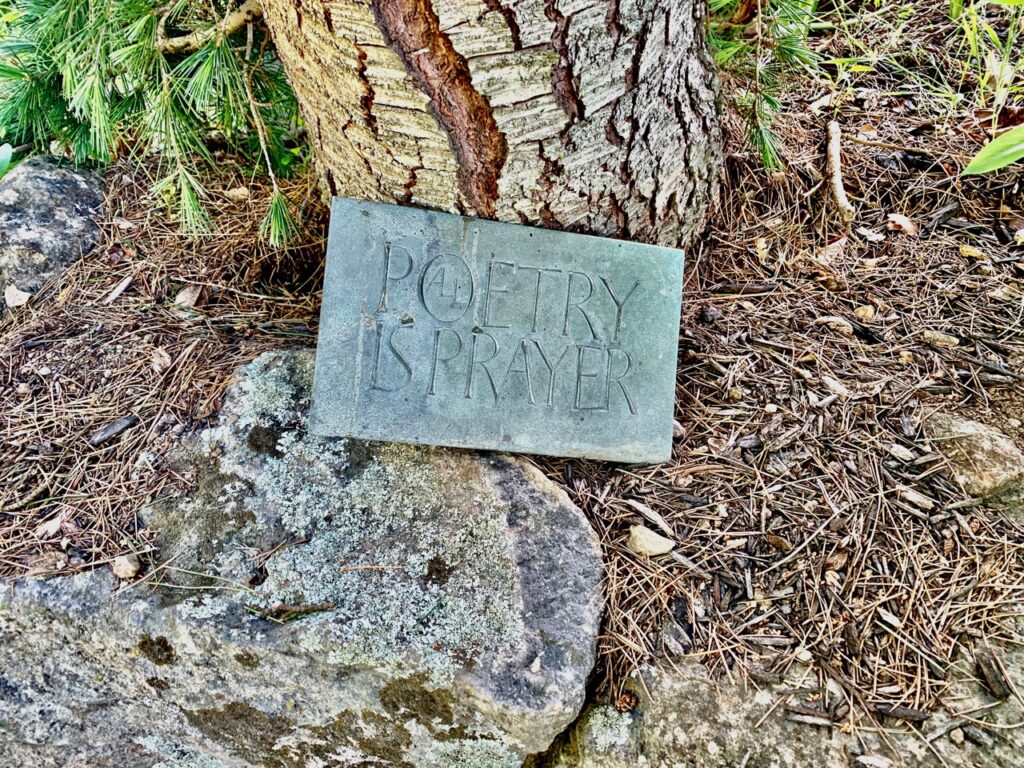
Poetry by our Poetry Editor, Jeff Kaliss
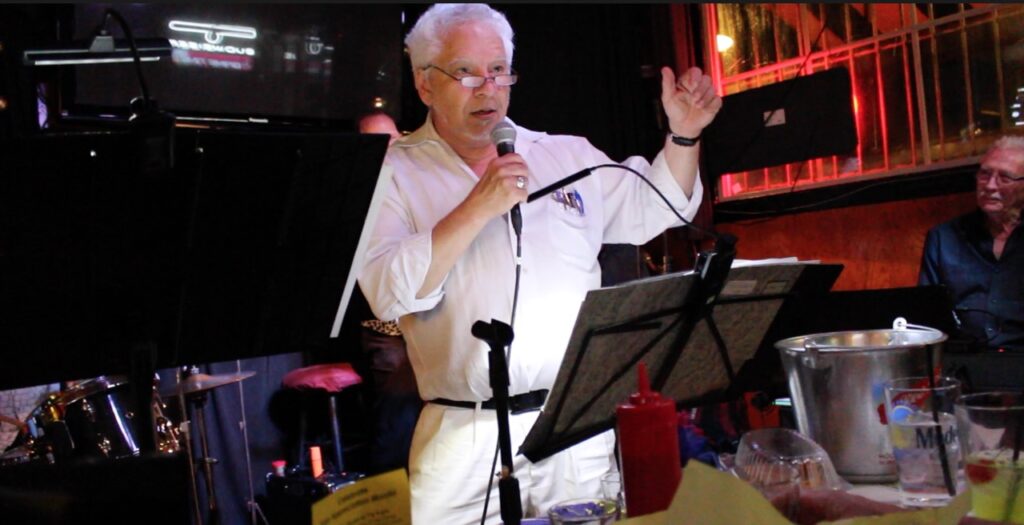
Jeff Kaliss reads poetry to jazz at 7 Mile House, San Francisco, with Don Alberts Renaissance Band. Late Don Alberts on keys at right. April 9, 2016. Photo: J.Macon King
For Jeff Kaliss interview see Salon.
A poem written while listening to Andrew Speight and group perform the title song, at the Café Stritch in San Jose.
songbook: Autumn in New York
Why does it seem,
long after I left,
long after she left,
autumn invites Aunt Stella
down from her penthouse
to walk her way
into it,
just a few blocks east
at Central Pak,
where 93rd stops being west.
And the hurried grid of Manhattan
spread-eagles suddenly
onto rocks and grass
and Stella can pass
through birds scurrying
through what’s left
of their September sounds,
and Stella can still sniff
past her own perfume
and still inhale
auspicious splendor
of autumn decay.
Passing the benches
of Central Park,
she kicks her Bergdorf boots
through unpackaged piles
of crackling russet riot
which the trees, green gone,
would not hold on to.
Stella turns to me
to wonder with me
what it will be like
to be scattered and remembered
this way.
Escapade
Speak to me through open windows,
in licking language,
with familiarity fresh
as it is tasty,
but showing off
in my shaded office,
so I can’t but smile
to let you know I know
that it’s you, not me.
Send me a letter
of love I don’t know yet
but you know,
because you are,
and you need a receiver
to press yourself upon.
Let me hear
how you sing to yourself,
when you’re romancing yourself,
when you’re wanting to get yourself into bed,
or out of it
and over to the desk.
Deliver to me
a caring package
of goodies you think I’ll like,
because you’ve binged on them,
and treat me to
the sources of what’s nourished you
and gotten you as far as me.
Transmit to me
groups of glyphs
to get me spinning
in your direction,
drawn towards you
through time and space,
together in new orbits.
Down Apiece
She lies down,
downhill from the clapboard house, and the barn,
far from her bed,
and she rises to rest
down left on Wyeth’s canvas.
There she stretches
along all our memories
where she may stay,
if only she can,
long past the sea-cooled day’s dusk
outside the town of Thomaston,
and long after,
after she’s gone to ground
in the town cemetery,
and the artist has been lain
beneath a worded stone,
way down along the rolling hills
of Pennsylvania.
For now, with us,
she feels with the brief, short life
of a Maine meadow,
in all its amber multitude,
her eyes, away from ours,
watching the waves of simple splendor,
no place for longing there.
The Death & Everlasting Life of Glenn Frey (1948-2016)
“It’s a girl, my Lord, in a flatbed Ford,
Slowin’ down . . . “
Slowin’ down, to pick up Glenn Frey.
That guy from the Eagles, taking the early ride,
the early flight south, to death.
Swing low, sweet Flatbed Ford!
Early to death, and early to rise,
makes a man legend, not always wise,
makes a man gone.
Makes me feed the jukebox at the Portals,
over forever nightcaps, forever.
Next morning, makes me wake up, to versify,
too early.
Slowing down, forever.
To take a look at me.
Young and firm and friendly.
To take a look at her.
Take a look at Linda!
Winslowing south on Routes 17 & 10, to Tucson,
to take a look at Linda Ronstadt, young and ripe
and hanging on a gearshift.
Hitching a ride on Linda’s flatbed wooden stage, way out West,
to the Whiskey a Go Go, on the Sunset Strip,
full of LA girls in halter-tops,
full of kinds of fun, legals and illegals,
for guys becoming Eagles,
full of guitars to grab, drums to pound, keyboards to twiddle,
full of the glad sounds of being,
sung through Linda’s succulent girl-mouth,
her chocolate eyes showing what we can do, and should do,
to try and pull the reins in.
Ride ‘em, Cowgirl, in tight jeans.
After the set, we unplugged, went out back, and got older.
We got sold, we bought,
we broke up bands and marriages.
We lost our hearing.
Or was it just the good music we lost?
And here we are with Glenn,
faded further than our jeans,
on our last, aching legs,
long hair grayed and thinned.
Wheezing in the dust of Winslow, Arizona.
Interstate 40 is the new Route 66.
Glenn was 67.
He wasn’t new.
But what a fine sight to see!
A final sight.
A girl, my Lord, with angelic horde,
slowin’ down to get old Glenn, dust him off,
and carry him to where the songs are free and forever.
She ain’t singing, that girl.
She might be humming.
But she sure looks like Linda.
When will she be back for the rest of us?
Jeff Kaliss reads poetry to jazz at Bird & Beckett bookstore San Francisco, 2018. Bassist Ollie Dudek. (Not shown singer Thu Ho, pianist Grant Levin.) 7 Mile House poster with Kaliss & King, 2016.
Note: Autumn in New York was originally published in Forum magazine from City college of San Francisco, Fall 2019. Bird & Beckett photo from Kaliss collection.
